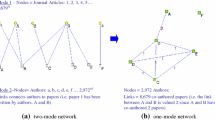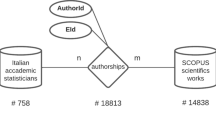Abstract
Some discussion papers about the ORTEGA hypothesis were published inScientometrics. One aspect of these discussions was the necessity for the future extension of empirical research to gain a better foundation for the acceptance or refutation of the Ortega hypothesis which states that the research done by average scientists substantially contributes to the advance of science. In this direction an empirical study about the stratification in coauthorship networks is represented in this paper. It was tested whether the extent of stratification decreases with the increasing number of coauthors per paper.
Similar content being viewed by others
References
M.H. MacRoberts, B.R. MacRoberts, Testing the Ortega hypothesis: Facts and artifacts,Scientometrics, 12 (1987) 293–296.
M.B. Line, The shoulders of giants, or the backs of mice?Scientometrics, 12 (1987) 297–298.
M.J. Moravcsik, We must ask questions before giving answers,Scientometrics, 12 (1987) 299–302.
V.V. Nalimov, Scientists are not acrobats,Scientometrics, 12 (1987) 303–304.
L. Leydesdorff,Towards a theory of citation?Scientometrics, 12 (1987) 305–310.
W.E. Snizek, In search of influence: The testing of the Ortega hypothesis,Scientometrics, 12 (1987) 311–314.
A.J. Meadows, Ortega hypothesis,Scientometrics, 12 (1987) 315–316.
M. Oromaner,Ortega, obliteration and policy consequences,Scientometrics, 12 (1987) 317–320.
S.M. Lawani, The Ortega hypothesis, individual differences, and cumulative advantage,Scientometrics, 12 (1987) 321–324.
A.J. Nederhof, A.F.J. van Raan, Citation theory and the Ortega hypothesis,Scientometrics, 12 (1987) 325–328.
H. Zuckerman, Citation analysis and the complex problem of intellectual influence,Scientometrics, 12 (1987) 329–338.
H. Small, The significance of bibliographic references,Scientometrics, 12 (1987) 339–342.
F. Narin, To believe or not to believe,Scientometrics, 12 (1987) 343–344.
S. Cole, J.R. Cole, Testing the Ortega hypothesis: Millestone or millstone?Scientometrics, 12 (1987) 345–354.
G. Green, A test of the Ortega hypothesis in criminology,Criminology, 19 (1981) 45.
M. Oromaner, The Ortega hypothesis and influential articles in American Sociology,Scientometrics, 7 (1985) 3–10.
J. Cole, S. Cole, The Ortega hypothesis,Science, 178 (1972) 368.
W.E. Snizek, A re-examination of the Ortega hypothesis: The Dutch case,Scientometrics, 9 (1986) 3–11.
H. Kretschmer, R. Müller, A contribution to the dispute on the Ortega hypothesis: Connection between publication rate and stratification of scientists, tested by various methods.Scientometrics, 18 (1990) 43–56.
P.R. Hofstätter,Gruppendynamik, Rowohlt, Hamburg, 1957.
H. Kretschmer, Social stratification of authors revealed from the coauthorship network. In:Informetrics 89/90 — Selection of Papers Submitted for the 2nd International Conference on Bibliometrics, Scientometrics and Informetrics, London, Ontario, Canada, July 5–7 1989,L. Egghe, R. Roussaeu, (Eds) Elsevier, Amsterdam, New York, Oxford, Tokyo, 1990, p. 193–200.
E. Noma, An improved method for analyzing square scientometric transaction matrices,Scientometrics, 4 (1982) 297–316.
H.-J. Czerwon,Bibliography (1980–1985). Quantized Hall Effect, Scientific Information Centre of the Academy of Sciences of the GDR, Berlin 1987.
A. Schubert, O. Toma,Quantitative Studies of Science. A Selected Bibliography (1980–1984). Department for Scientometrics, Library of the Hungarian Academy of Sciences, Budapest, 1988.
W. Glänzel,Bibliography (1982–1985). Endoxan. Department for Scientometrics.Library of the Hungarian Academy of Sciences, Budapest, 1988.
H.-J. Czerwon,Bibliography (1979–1984). Monte-Carlo Simulations in Lattice Field Theories, Scientific Information Centre of the Academy of Sciences of the GDR, Berlin 1987.
Author information
Authors and Affiliations
Rights and permissions
About this article
Cite this article
Kretschmer, H. Measurement of social stratification. A contribution to the dispute on the ORTEGA hypothesis. Scientometrics 26, 97–113 (1993). https://doi.org/10.1007/BF02016795
Received:
Issue Date:
DOI: https://doi.org/10.1007/BF02016795




